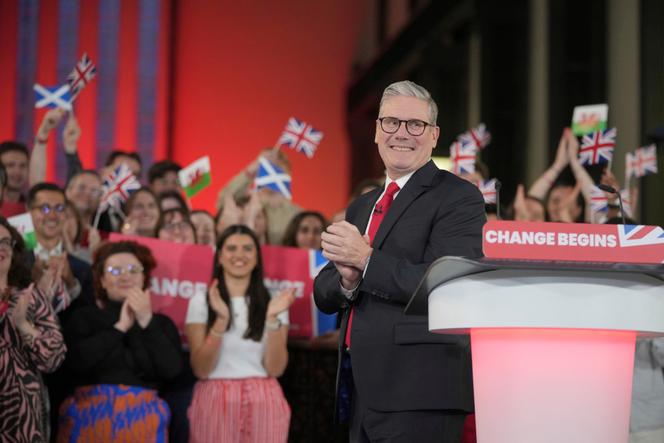


It was stifling hot under the glass roof of Lindley Hall, an Edwardian building near Victoria Station in central London. A few hundred Labour Party activists had gathered there on Saturday, June 29, for one of the last rallies of the British left before the July 4 general election. In the polls, the party was 20 points ahead of the ruling Conservatives, who had failed to close the gap during the six weeks of campaigning. Stand-up comedian Bill Bailey delivered a few good words and a short video of mega-star Elton John endorsing Labour was released. The women were wearing floral dresses, the men were in Bermuda shorts, and the atmosphere was cheerful and summery.
Yet when Keir Starmer, the Labour leader who is due to become Britain's 58th Prime Minister on Friday, took the floor, white shirt over dark pants, he remained "buttoned up," as the British say: rigid, even uptight. "Change doesn't happen unless you vote for it. Nothing is decided, not a single vote has been won or lost, and each and every vote is out there," warned the 61-year-old leader, with his thick hair and piercing eyes behind thin glasses, urging his supporters not to celebrate victory too soon.
After weeks of extremely cautious campaigning, calibrated to reassure those disappointed by the Tories and Brexit, it was still the lawyer speaking, the man who for 20 years was an authority on human rights, renowned for his method and his eye for detail. It was only during Taylor Swift's June concert at Wembley that this man, who is very protective of his private life, seemed to let go a little. In a photo posted on X, he could be seen in the stands, beaming, embracing his wife, Vic, the mother of his two teenage children.
Starmer has been widely criticized since he took over as Labour leader in April 2020 for not being inspirational enough. It's true that the MP for Holborn and St Pancras (in central London) doesn't have the charisma of the leader of the right-wing populist Reform UK party, Nigel Farage, nor the oratorical brilliance of a Neil Kinnock, Labour leader in the 1980s, nor the youthfulness of a Tony Blair, who brought the party to power at the age of 44, in 1997. Starmer does not apparently enjoy the performative part of being an elected politician, "there's no joyous process for him, being on TV or being a platform and having crowds. He's forced himself to do stuff he doesn't particularly like because he thinks it's important," explained his biographer Tom Baldwin, a former Times journalist who became an adviser to Ed Miliband, Labour leader in the 2010s.
You have 75.55% of this article left to read. The rest is for subscribers only.
